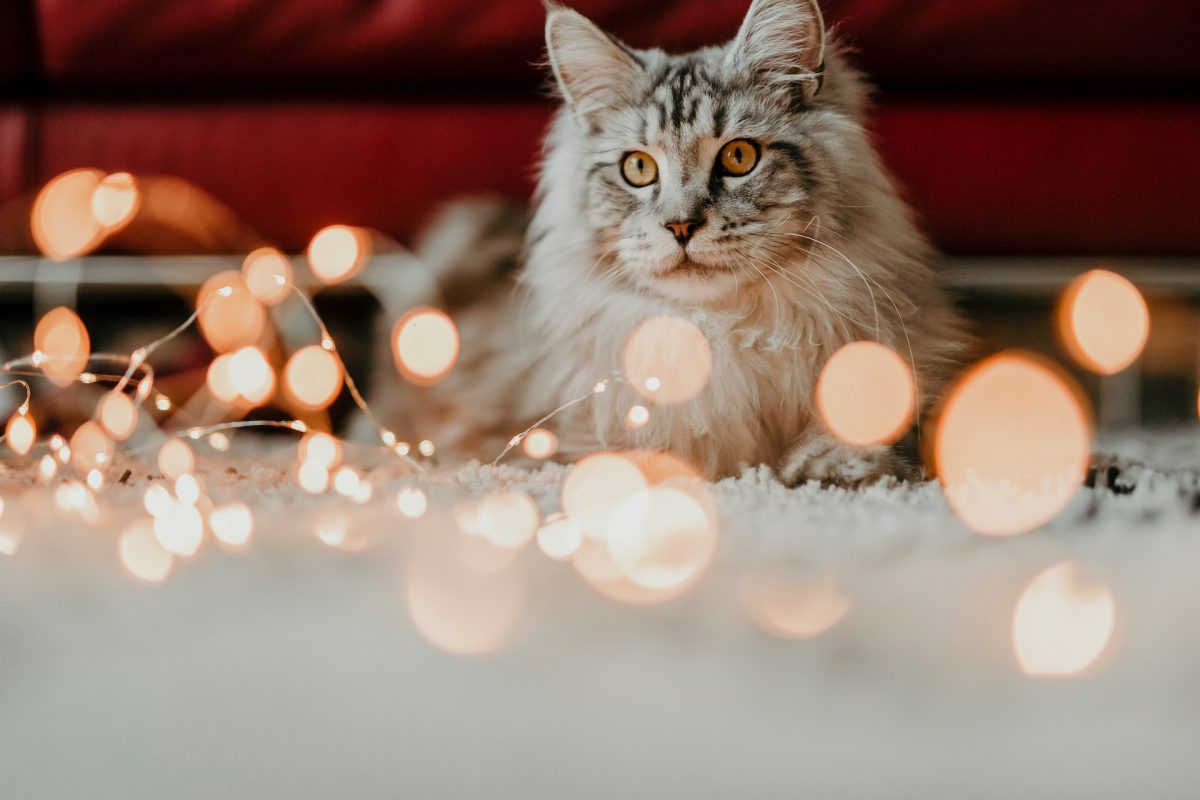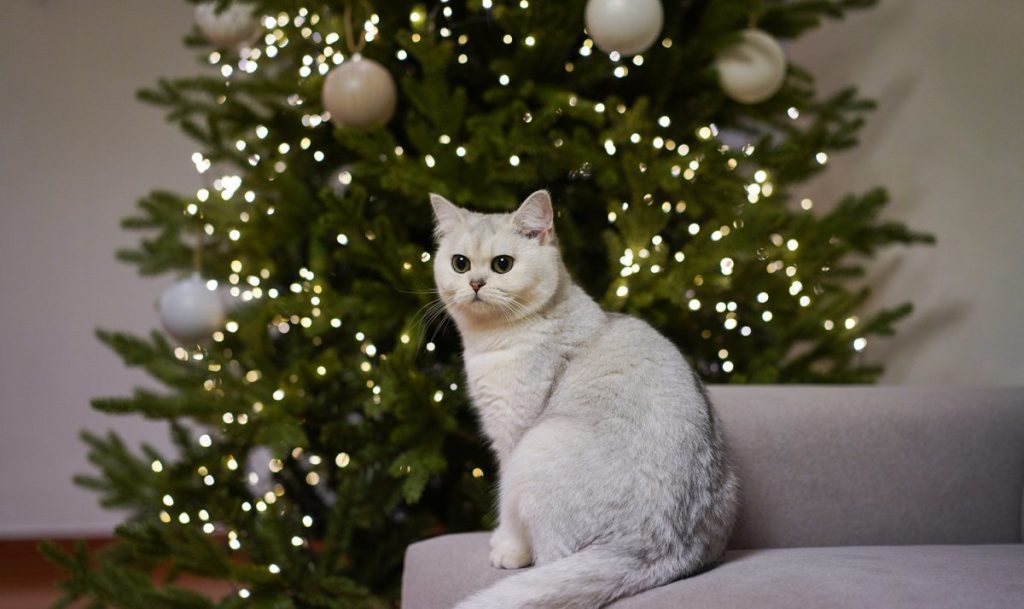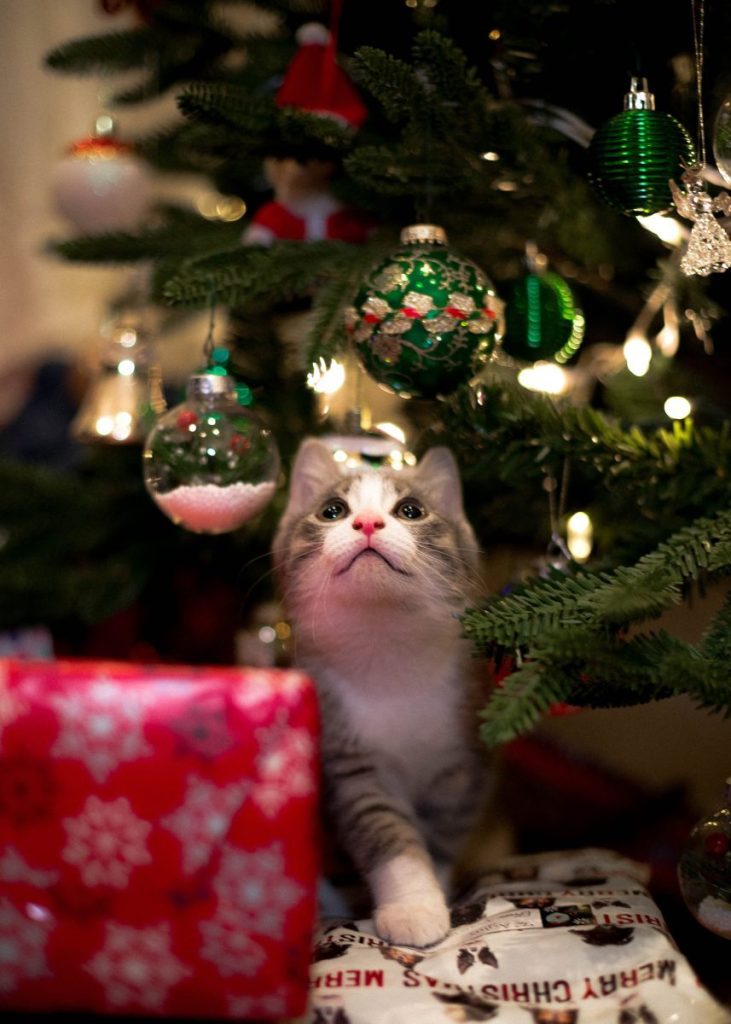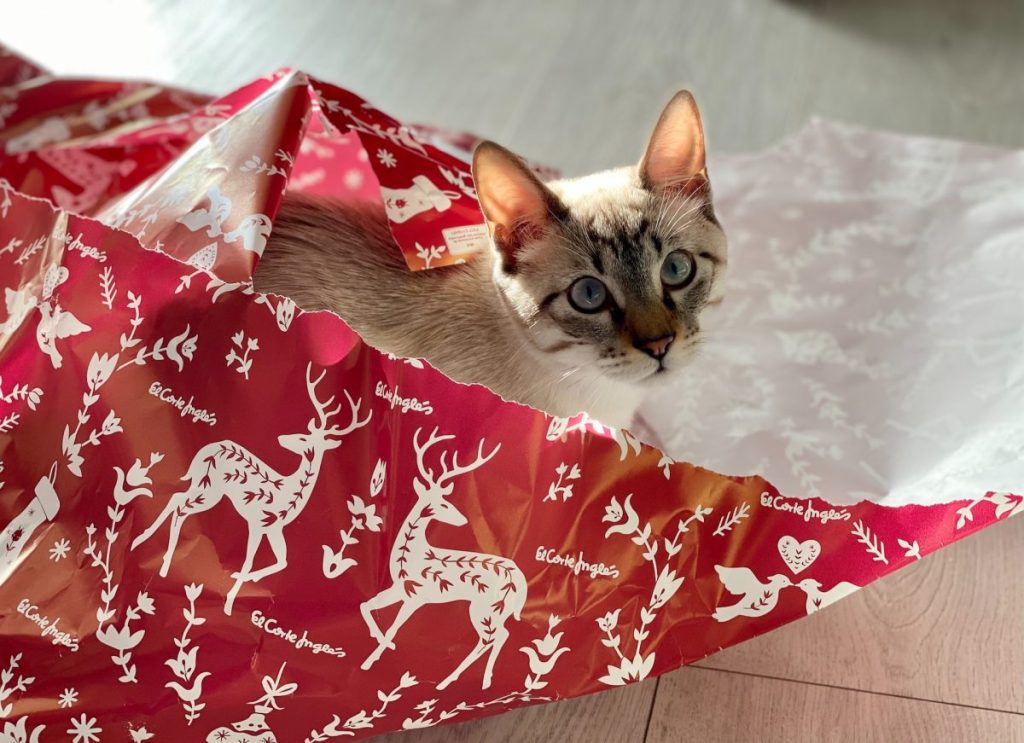
Taking Care of Your Cat at Christmas
Nov 7 2022.
For many people, cats complete Christmas. Time off and time at home means more quality time with our kitties. Few things beat curling up with a fluffy kitty in front of a favorite festive movie and cats look even more beautiful when lit by fairy lights. Christmas can, however, be fraught with potential dangers for our furry friends. The increase in home hazards leads to a leap in calls to emergency veterinary lines every year at Christmas. Keep your kitty safe this festive season with Cat in a Flat‘s guide to cat care at Christmas.
Table of contents

Cat care and Christmas trees
Cats love to climb trees. Humans like to bring trees inside the house at Christmas. This combination often results in problems as kitties assume the tree is their new plaything. There’s a good chance a cat attempting to climb the Christmas tree could end up with broken ornaments, but the real risk is that the tree topples and causes real injury to your cat, as well as damage to your house.
Pine needles if ingested can also cause terrible digestive problems for your kitty. Supervise your cats around the Christmas tree, or place it in a room you can shut kitty out of. To keep Mr Whiskers safe, vacuum or sweep up the needles every day, keep the tree watered, cover the watering pot so that your cat doesn’t drink from it and make sure the tree has a secure base to prevent it toppling over.
Christmas ornaments and kitties
Trinkets, fairy lights and tinsel bring a festive home to life but be wary of your cat around them. Taking care of your cat at Christmas means never leaving them alone with ornaments and choosing them carefully to keep kitty safe.
Smashed glass ornaments can hurt furry paws or can be extremely dangerous if eaten. Try and choose hard plastic ornaments, attach them securely and place them at the top of the tree.
Tinsel might not look delicious, but cats love playing with these sparkly strings, and that can result in chewing and swallowing little pieces of shiny plastic. When ingested, tinsel can cause dangerous blockages in a cat’s digestive tract, so use an alternative when possible.
Fairy lights can be hazardous for cats who might chew on or become tangled in the wires. Cats are particularly prone to chewing when anxious, and as animals who don’t like change, Christmas can be a stressful time. Unplug fairy lights when you aren’t there to supervise and make sure they are securely attached and placed only on the top half of the Christmas tree. You could also use battery-powered LED lights as a safer alternative.
Candles are also a potential hazard for you and your kitty as they could fall over if brushed against or even cause burnt noses or whiskers. Light candles only when you are there to supervise and keep them out of the way of your furry friend.

Festive food and felines
Everyone overindulges at Christmas, but for cats, the extra treats lying around can be dangerous rather than fattening. Kitties are allergic to a lot of things that are safe for humans so take care not to leave Mr Whiskers unattended around your Christmas feast.
Grapes are toxic to cats, as are the currants, sultanas and raisins used in cake and pudding.
Just a tiny amount of chocolate can lead to poisoning, so keep sweet treats away from your furry friend.
The onion and garlic in your gravy and stuffing can also be toxic to kitties.
Your kitty might be most interested in the ham, chicken or goose served at Christmas but remember that cooked bones are hazardous for cats as they can splinter and become lodged in the intestines or stomach. Keep meat away from cats and make sure to place any carcasses in secure trash cans.
Alcohol is also noxious to cats, so don’t leave out any unfinished glasses and mop up spills as quickly as you can.
Christmas plants and your cat
Traditional festive plants, including mistletoe, ivy, holly, and poinsettia, are potentially poisonous for your cat. Take care not to bring any into the house this Christmas or keep them well away from your cat.
Lilies are one of the most frequent sources of cat poisoning. If you receive any in a Christmas bouquet, remove them from the house immediately and dispose of them securely to stop any chance of Mr Whiskers coming into contact.
Wrapping paper and Mr Whiskers
Shiny paper, bows and ribbons can look like tempting toys for your cat. While chasing after Christmas ribbon can be harmless fun, kitties should never be allowed to chew on ribbons. Similarly, bits of tape and plastic-coated paper can damage a cat’s digestive organs.
Important note: the festive season is one of the busiest for cat sitters. Remember to book your cat sitter as early as possible if your kitty will need Christmas care. At this time, please also check our Covid-19 help page to keep you and your sitter as safe as possible.

Christmas gifts for your cat
Once everything is safe and secure, treat your cat this Christmas with a thoughtful and loving gift.
- Grooming glove – keep your cat’s fur in tip-top condition with a bristle-covered grooming glove. Most cats love the sensation of being brushed and stroked at the same time. Regular grooming helps prevent excess shedding and furballs and hopefully will elicit lots of lovely purrs too!
- Scratching post or pad – these are key to keeping furniture claw-mark free. There are dozens available on the market but make sure to get one big enough for your cat that is sturdy and won’t topple. A suitable scratching post might also help keep curious claws away from the Christmas tree.
- Christmas treats – we all enjoy a feast at Christmas so. Snacks made with healthy ingredients meat – including turkey! – are best for kitties. You could even try making your own at home.
- Catnip toys – a special toy stuffed with catnip can be a real joy for both kitties and humans. Keep it festive with one shaped like Santa or a Christmas tree but don’t leave catnip treats under the tree. Curious and sensitive kitty noses might sniff it out and rip it open well before the 25th December.
- Heat pad – in colder climates cats will appreciate the warming comfort of a heat pad. The best react to pressure and body temperature to provide a cozy surface for napping.
Now you’ve sorted your cat care for Christmas, why not treat the kitty lover in your life to one of these top cat books or films?
- #christmas holiday
- #christmas present for cat
- Cat Care
- christmas cat care
- holiday cat care
- holiday planning
